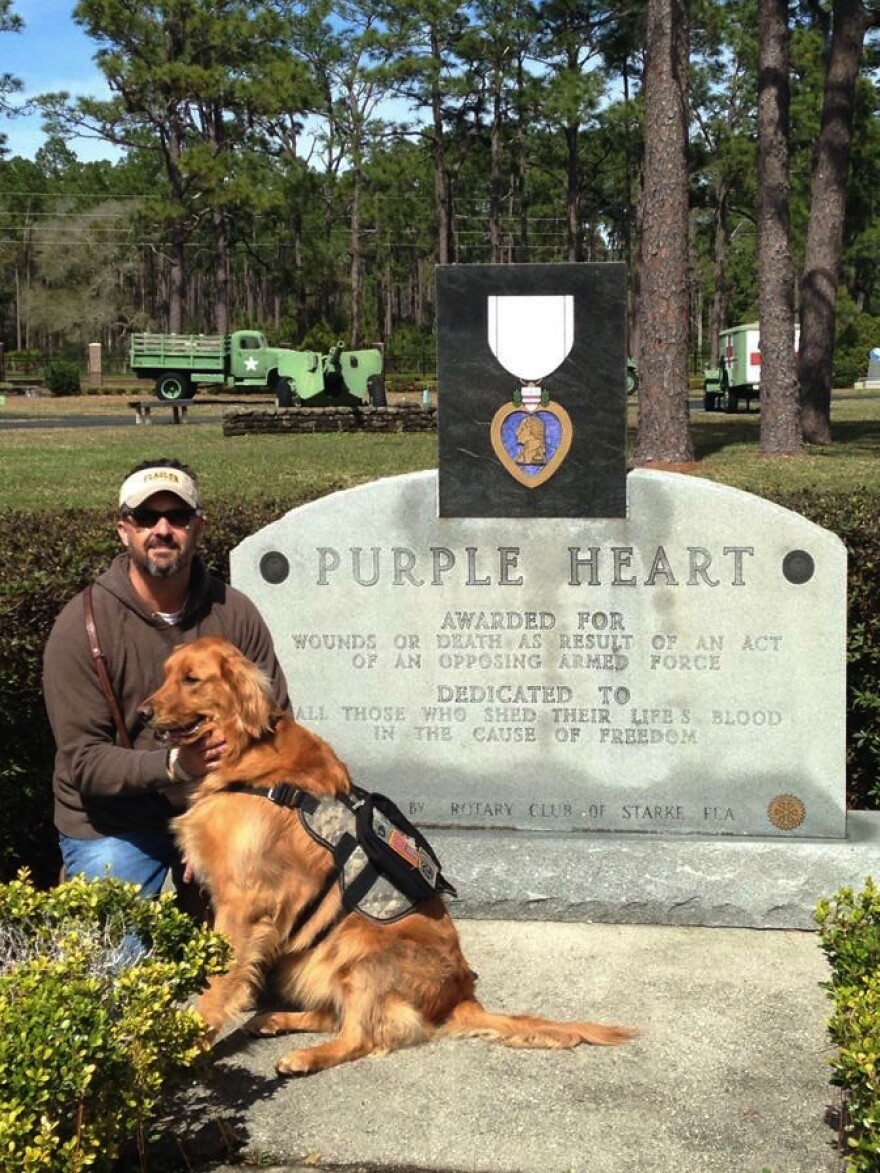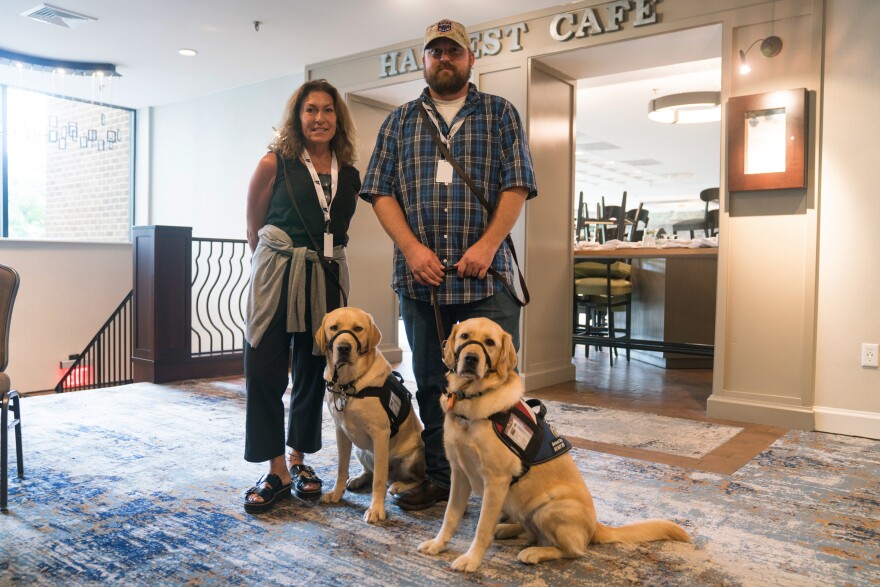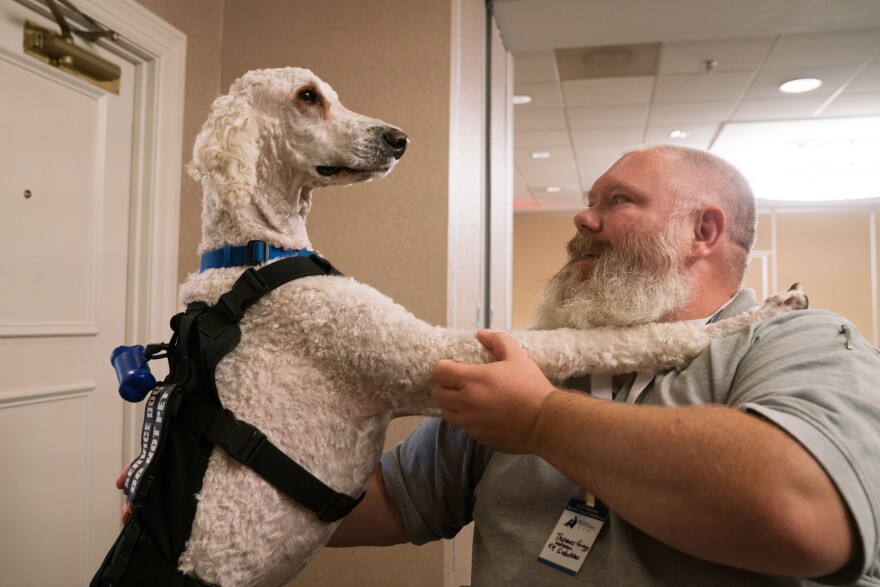Retired Army Sgt. Kevin Crowell boarded an American Airlines flight from Miami to Key West with his wife and his psychiatric service dog Bella in April 2014. They were heading to a couples retreat sponsored by the Wounded Warrior Project.
Crowell, who has been diagnosed with Post-Traumatic Stress Disorder from an explosion during his deployment to Iraq in 2004 and 2005, says he made sure he properly documented the golden retriever over the phone, days ahead of his trip.
But, Crowell says, gate agents denied him a seat in the bulkhead of the plane, where Bella could sit comfortably in front of him, because "pets" were not allowed there. And when Crowell got off the plane to explain his situation, an airline representative petted Bella, which is strictly against suggested service dog guidelines.

The situation triggered Crowell's PTSD, turning a relaxing vacation into a "ginormous anxiety-producing disaster," according to the veteran. The family missed their flight to Key West and drove six hours back home. Crowell later sued American Airlines, and the Department of Transportation found that the airline failed to sufficiently train its employees on how to accommodate passengers with service animals.
"Bella has helped me through the hardest times in my life," Crowell says. "But with her comes travel challenges. It's so stressful that my wife refuses to travel with Bella anymore."
Crowell is not alone. Many veterans and active-duty service members use psychiatric service dogs to help alleviate the everyday challenges of PTSD, Traumatic Brain Injury and Military Sexual Trauma — conditions that service dog advocates call "invisible injuries." Now, the service dog community is eyeing a dog certification system to streamline travel and leisure for veterans who, like Crowell, are frustrated with the arduous process and stigmas attached to taking trips.
"Their life is getting smaller"
Rory Diamond is the CEO of K9s For Warriors, a nonprofit organization that bills itself as the largest provider of psychiatric service dogs for veterans.
"Most of our graduates would rather not fly," he says of the veterans who have passed through the K9s For Warriors pairing and training program. "We realize that their life is getting smaller because of fake and poorly trained service dogs and we want their life to be big. We want them to have every opportunity."
Diamond is referring to controversy this year surrounding the influx of pets boarding planes under the guise of emotional support or service animals.
The 1986 Air Carrier Access Act does not define emotional support animals, creating an opportunity for enterprising passengers to pass off their household pets as ESAs to avoid paying pet fees. Legislation introduced in Congress in April would amend the ACAA with stricter definitions.

Psychiatric service dogs are different. They perform tasks to interrupt mental and emotional crises, such as waking their owners from nightmares, distracting them from painful flashbacks, and making space in crowded areas. And unlike emotional support animals, psychiatric service dogs are protected under the federal Americans with Disabilities Act. Even still, the ADA does not set a behavioral standard for service dogs, nor require any training.
"There's no real across-the-board standard for behavior or tasks for all service dogs. And there's a number of reasons for that, one of which is that there's so many types of service dogs," says Sheila Goffe, vice president of government relations for the American Kennel Club. "But the concerns that a lot of people have had ... is that we're seeing a lot of poorly trained service dogs out there that can actually be a threat to public health."
"Zoo-like atmosphere"
In January, a viral photo of a woman trying to board a United Airlines flight with an emotional support peacock prompted the carrier to tighten its policies on emotional support animals. United says it has seen a 75 percent increase in passengers boarding with ESAs, year after year.
American Airlines notes that in the last three years, three times as many emotional support animals boarded its aircraft — birds, sloths, kangaroos and pigs among them — than service animals, according to a comment filed by the carrier with the DOT.
American describes the "zoo-like atmosphere" of airplane cabins crowded with emotional support animals, which are often registered online by for-profit companies that provide neon "support animal" vests and paper certificates for a fee.
"Lady with dog lying on the floor, comforting the dog," one American Airlines flight attendant documented in a flight service report last year. "The 2 emotional [support] dogs were snapping at one another and agitated," another attendant noted earlier this year.

Those instances, service animal advocates say, create challenges for veterans who might not look disabled.
"When a veteran walks into a public store or restaurant and gets a stink eye because the person before him was there with a fraudulent dog, it puts a lot of stress on them," says Gina Esoldi of Next Step Service Dogs.
Crowell, the veteran who sued American Airlines, says the general population doesn't understand veterans who have service dogs. He's received disapproving glances and invasive questions about his dog Bella.
"A service dog means you're blind, you're faking it, or you're crazy," says Crowell of public perception.
In addition, veterans must provide documentation of the tasks their service dogs perform at least 48 hours before travel, according to ACAA guidelines. They can be questioned about whether their dogs are service animals and what tasks that dog performs for them. Most travel and leisure companies also require verification of vaccination.
"You make one call to the airline and you get the runaround," Crowell says. "People think that having a service dog gives you magical access. But it makes you have to deal with other human beings every step of the way."
"Improving the social mobility of veterans"
Two registries in development would offer legitimacy for veterans with psychiatric service dogs. Diamond likens the idea of a registry to the TSA pre-check system: instead of providing paperwork that proves their disability and their dogs' vaccinations, veterans present a searchable identification number to any travel or leisure provider.

That number — on an I.D. card or a dog vest patch — can be used to verify the dog has been tested by an independent evaluator on its ability to perform tasks that alleviate symptoms of psychiatric disability, as well as on the dog's behavior in public spaces. It might also link to veterinary records and proof of military service.
The first registry is called Operation Service Dog Access and was created by American Humane, the organization best known for its certification that "No Animals Were Harmed" in the making of films and television shows. Two dozen veterans, approved by a small network of independent evaluators, are doing a pilot program with the registry, according to the project's senior research adviser Amy McCullough. American Humane hopes to open the registry in the fall, with the help of some service dog providers and Assistance Dogs International, the country's largest opt-in accreditation organization for service dogs. The service will be free.
"This project is all about improving the social mobility of veterans," McCullough says.
The second registry, the American Service Dog Access Coalition, is currently being workshopped by a group of service dog providers, including K9s For Warriors. Veterans who have graduated from a recognized dog pairing and training program will automatically enter into the registry. For self-trained pairs and service dogs acquired outside partner programs, ASDAC will use American Kennel Club-registered evaluators at more than 1,500 Petco dog store locations across the country. A subsidiary of Dell Technologies is developing the online registry. ASDAC hopes to roll out its registry in six months, available to veterans for a small fee.

Both registries face challenges. Neither program has received formal support from major airlines or travel destinations yet, according to Diamond and McCullough, despite both holding meetings with a slew of industry giants.
"If we do it right, we will see large-scale adoption," says Keith Salisbury, who is leading technical support for the ASDAC registry on behalf of Dell subsidiary Pivotal. "Access providers like airlines would love to have an easy way to deal with what has become a legitimate problem."
And if both registry programs come to fruition, they might be in direct competition.
During a panel discussion at the Association of Service Dog Providers for Military Veterans annual conference, Diamond said he knows that similar programs are out there, but that the ASDAC is the only "collaborative way to take hold of this issue for ourselves and not have it imposed upon us."
McCullough of Operation Service Dog Access had not heard of the ASDAC initiative. She says that she hopes "people can work together to solve this issue and improve access."
Both programs, in the long term, hope to expand their registries to all members of the service dog community.

Crowell believes that a registry system will vastly improve the relationship among veterans, their service dogs and access providers like airlines or rideshare services.
"Service dogs are only going to become more prevalent as war continues and as scientific research proves what this therapy can do," Crowell says. "A registry creates communication and reduces barriers. When people can gather and share information, it's a huge win for everyone."
Copyright 2021 NPR. To see more, visit https://www.npr.org. 9(MDA5NTM4MTIyMDE0MTg3NDc2MTVlZjdmNQ001))



